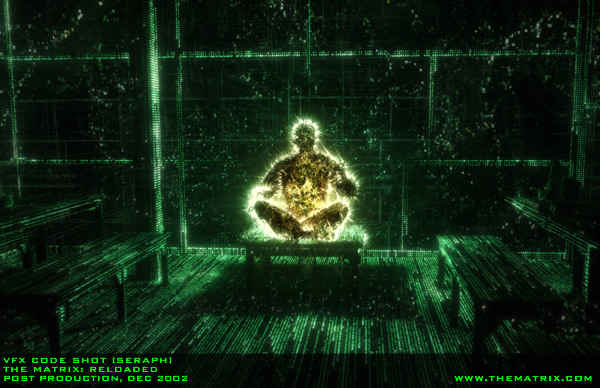|
The Matrix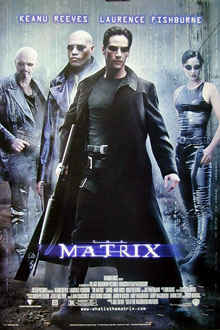 Maybe if your college philosophy class had featured insane kung fu stunts, car chases and digital FX, you might have scored that coveted 2.9 grade point average.
Maybe if your college philosophy class had featured insane kung fu stunts, car chases and digital FX, you might have scored that coveted 2.9 grade point average. "The Matrix" is one of those truly bizarre phenomena that restore your faith in humanity. Released in 1999 with little hype by the then-unknown writer-director team of Andy and Larry Wachowski, "The Matrix" appropriately snuck into the American zeitgeist like a computer virus in the brain. The movie was an unlikely combination of Hong Kong action flick, Philip K Dick sci-fi, second-year philosophy, Gnosticism and leather, intellectual riddles and Keanu Reeves. (Spoilers for the first "Matrix" follow.) The premise goes something like this: The world as we know it is not real. It is a computer simulation of the now-destroyed "real" world, run by intelligent machines who grow human bodies in giant pod farms for use as an electrical power supply. The machines discovered that bodies die when their minds atrophy, so they created the Matrix, a massive virtual reality simulation designed to keep the human race placated in a not-so-gilded cage. A few individuals with powerful minds act as freedom fighters in this brave new world; they have learned the unreality of the Matrix and have seen the ugly truth of the real world. Because they know the Matrix is unreal, they can bend the laws of physics when they are inside providing a ready made excuse for the truly unbelievable fight sequences. The Wachowski brothers had been raised on a steady diet of Japanese animation and Hong Kong action movies, and it really, really shows. The first Matrix featured action sequences unlike anything the cinema had seen before or since... Until the "Matrix Reloaded" debuted in 2003, anyway. The action sequences in the Matrix films feature a mind-bending array of impossible stunts and time-warping perceptions. The most famous effect, known as "bullet time," involved slowing the action mid-fight so that you could see the flight of bullets in midair.
But for all the glitz and "holy shit" visuals, the movie's cult success was driven in large part by the concepts. The Wachowskis were Renaissance geeks, and they were influenced by just about every bit of weird shit you can imagine. The Gnostic worldview is strongly represented throughout the movie, which coincides with the Philip K Dick-style paranoia and questioning of reality. Grant Morrison's counter-culture comic book The Invisibles was kept on the set during the filming of the first movie, and its influence is also clearly visible throughout. In an unreal universe, your mind is the most powerful tool, a concept frequently referenced throughout the trilogy. While movie reviewers robotically fixated on Neo as a dot-com hero of the 1990s, they frequently missed some of the broader philosophical points, including the extremely unsubtle message that Neo has much more in common with Jesus Christ than Kevin Mitnick. The Matrix was also influential in more disturbing ways. The movie featured an extraordinary amount of gunplay, even by the most jaded action film standards, leading a variety of weak-minded psychos to blame the Matrix for their questionable behavior. The highest-profile case was Columbine high school massacre in 1999, in which Eric Harris and Dylan Klebold armed themselves to the teeth, donned black trench coats and gunned down a couple dozen classmates, killing 15 of them. They claimed to have been influenced by the Matrix, as did quite a few other crazy killers. Some even tried to use the movie in their legal defense, explaining that they killed people because they realized after watching the movie that nothing was real.
Although they had decided the plot details long before the first movie was even released, they approached the sequels with a fresh eye toward two major issues. Their first goal was to top the special effects innovations in the original movie, and their second goal was to figure out how to do the sequels and still pull in a profit. The original Matrix cost about $63 million to make; its sequels would approximately double that, even with cost-saving measures in place, including shooting both films back to back during a marathon six-month production that saw cast members die, marry, become pregnant and break bones performing the mind-blowing stunts. The two sequels were scheduled for back-to-back releases, with "The Matrix: Reloaded" appearing in May 2003 and "The Matrix: Revolutions" set for a November 2003 debut. "Reloaded" upped the ante on action with a numbing freeway chase, featuring an incredible martial arts battle on top of a speeding semi truck and the spectacle of Keanu Reeves in a courtyard fighting hundreds of clones of his nemesis, Agent Smith, a computer virus. The movie also upped the philosophical ante with several dramatic (but not entirely unexpected) revelations about the nature of the Matrix and the dynamics driving the characters into their respective roles, as well as brain candy such as some fun insider references to the Knights Templar and the true secret of the Holy Grail. The contents of "The Matrix: Revolutions" remain a closely guarded secret, with only a sparse trailer after the 20-minute credit sequence in "Reloaded" to provide any clues. It would be nice to think that pop culture could produce a truly paradigm-shattering, world-changing evolution in philosophical thought, but you'll have to wait until November to find out. UPDATE: "The Matrix: Revolutions" has been released. The general consensus is that it sucks and doesn't answer shit. At the risk of spoiling the "surprise" for the three people in the world who didn't see it coming, the concluding chapter of the Matrix trilogy descends into the sort of depressingly predictable Christian Crucifixion equivalency that the original movie would have scoffed at. Neo as Jesus Christ? Yeah, wow, that's original. Gnostic, my ass... They could have at least made Trinity into the Christ figure and invited a little controversy. Between Neo, Frodo and Mel Gibson's new Jesus, that's three Christ-on-a-stick Hollywood blockbusters in one 12 month period, which is surely some sort of sign that the end is near...
|
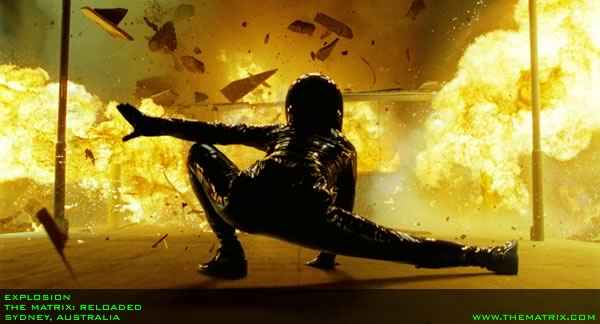
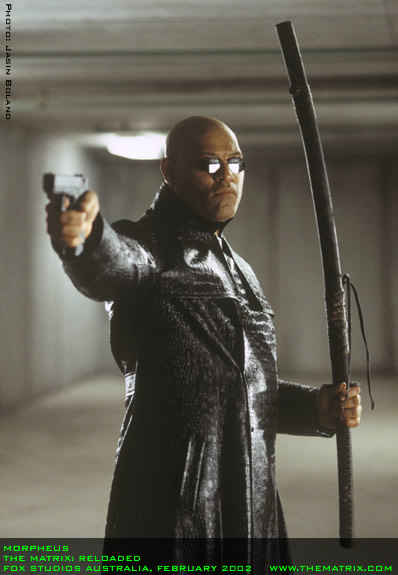 And they did it with style our heroes Neo (Reeves), Trinity (Carrie-Ann Moss) and Morpheus (Laurence Fishburne) were not just decked out in the oh-so-'80s camo of "Rambo" and "Predator" vintage. One of the perks of transcendent gnosis is apparently the freedom to whip up whatever wardrobe you prefer, which involves using startling amounts of leather and vinyl for maximum hipness.
And they did it with style our heroes Neo (Reeves), Trinity (Carrie-Ann Moss) and Morpheus (Laurence Fishburne) were not just decked out in the oh-so-'80s camo of "Rambo" and "Predator" vintage. One of the perks of transcendent gnosis is apparently the freedom to whip up whatever wardrobe you prefer, which involves using startling amounts of leather and vinyl for maximum hipness. 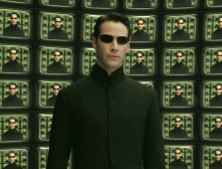 After "The Matrix" became a surprise cult hit, grossing upwards of $170 million in the U.S. and hundreds of millions more overseas, sequels followed as surely as night follows day. The Wachowskis had always planned to continue the story in some form (it was originally planned as a comic book), but the movie's shocking success allowed them to start thinking bigger.
After "The Matrix" became a surprise cult hit, grossing upwards of $170 million in the U.S. and hundreds of millions more overseas, sequels followed as surely as night follows day. The Wachowskis had always planned to continue the story in some form (it was originally planned as a comic book), but the movie's shocking success allowed them to start thinking bigger. 